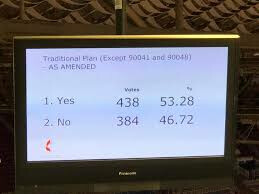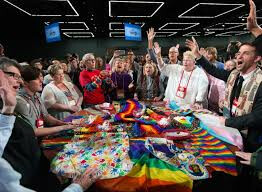Uniting Methodists Implore Judicial Council to Reconsider
by Erik Alsgaard
Eleven delegates from the 2019 Special Session of General Conference, including five leaders from the UMCNext movement, have filed a petition with the Judicial Council asking them to reconsider their rulings from decision 1378.
That April 25 ruling upheld certain parts of the so-called Traditional Plan, adopted at the Special Session, calling for more severe penalties for clergy who perform same-gender weddings, expansion of the definition of “self-avowed, practicing homosexuals,” and prohibiting bishops from ordaining self-avowed practicing homosexuals. Most of the provisions that were found constitutional go into effect Jan. 1, 2020.
 The “Petition for Reconsideration,” which is allowed under Rule IX of the Judicial Council’s Rules of Practice and Procedure, was filed by the Rev. Tom Berlin, Jay Brim, Evelynn Caterson, Lonnie Chafin, Rev. Ginger Gaines-Cirelli, Rev. Adam Hamilton, Rev. Mark Holland, Phil Moots, Dave Nuckols, Rev. Donna Pritchard, and Rev. Cynthia Weems. Gaines-Cirelli is lead pastor at Foundry UMC in Washington, D.C.
The “Petition for Reconsideration,” which is allowed under Rule IX of the Judicial Council’s Rules of Practice and Procedure, was filed by the Rev. Tom Berlin, Jay Brim, Evelynn Caterson, Lonnie Chafin, Rev. Ginger Gaines-Cirelli, Rev. Adam Hamilton, Rev. Mark Holland, Phil Moots, Dave Nuckols, Rev. Donna Pritchard, and Rev. Cynthia Weems. Gaines-Cirelli is lead pastor at Foundry UMC in Washington, D.C.
Berlin, Nuckols and Pritchard served on the Commission on a Way Forward, the group appointed by the Council of Bishops in 2016 to do a “complete examination and possible revision of every paragraph of the Book of Discipline concerning human sexuality and explore options that help to maintain and strengthen the unity of the church,” according to their website.
Berlin, Chafin, Gaines-Cirelli, Hamilton and Weems are also on the leadership team of UMCNext, a group of progressive United Methodists working on a response to the actions of the 2019 Special Session.
The petitioners state that decision 1738 is “demonstrably erroneous,” one of the criteria for the Judicial Council to reconsider its actions. At its heart, they argue, the Petition for Reconsideration argues that just as the General Conference adopted the Traditional Plan as an entire package in a single vote, the Judicial Council should have invalidated the TP in its entirety upon determining that seven of its 16 petitions were found unconstitutional in decision 1738.
“The (Judicial) Council was entirely mistaken in its pivotal conclusion that Traditional Plan advocates had no choice but to leave in place the unconstitutional aspects of the Traditional Plan,” they write, “enacting them ‘as is,’ without seeking to fix the constitutional infirmities by amendment because ‘bringing the TP into alignment with the Constitution (of The United Methodist Church) would have necessitated ‘dividing the question,’” which the Presiding Office disallowed.”
Citing legal precedence from the United States Supreme Court that if a piece of legislation does not have a “severability clause,” the “legislature intends an act to be effective as an entirety,” the petitioners note that none of the Traditional Plan petitions contain such a clause.
They also cite examples where the various plans were first rank ordered as whole plans by the General Conference acting as one Legislation Committee, not separate petitions. “Votes were cast,” they write, “on the plans as a package.”
And during the plenary session, when delegates were debating and voting on the various plans, an effort to “decouple the Traditional Plan petitions for voting purposes” was “overwhelmingly affirmed.” However, they note, the Presiding Office, Bishop Cynthia Fierro Harvey, Louisiana Area, denied that request.
But an even more egregious effect of the adoption of the Tradition Plan, the petitioners write, is that it is unjust and “nothing more than a betrayal of the 2016 General Conference’s plainly stated purpose in approving the Way Forward process.”
The result is that the validation “imparted by JCD 1378” has “stood on end” the stated objectives for the convening of the Special Session. “In lieu of an integrated and comprehensive approach that addressed the ‘entire subject’ of ‘human sexuality,’ the denomination has been handed a truncated version of a plan that, far from allowing ‘for a variety of expressions to coexist in one church,’ is being championed by Traditional Plan advocates as just the first installment in a series of legislative proposals.”
Against this backdrop, they write, it is no surprise that the continued unity of the church is “now more imperiled than ever.”
The Judicial Council’s next scheduled meeting is set for Oct. 29 through Nov. 1, in Evanston, Ill.
